Almost There: Paul Newman & Robert Redford in "Butch Cassidy and the Sundance Kid"
 Monday, April 20, 2020 at 9:01PM
Monday, April 20, 2020 at 9:01PM 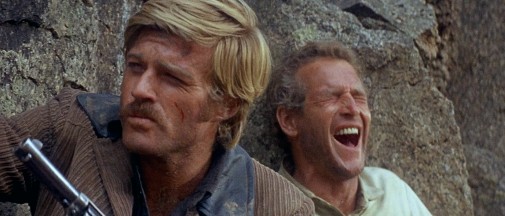
From 1944 to 2008, we had a five-wide Best Picture race in the Oscars, as well as four acting categories. During those years, it became rare for a movie to score a Picture nomination without also nabbing some sort of acting nod. It was especially unusual for the majority of a given line-up to be devoid of acting nods, happening only three times during those 65 years. One of those times was the 1969 Academy Awards, when Z, Hello, Dolly! and Butch Cassidy and the Sundance Kid didn't get any love from the acting branch. Considering the general bias against "foreign language" performances and the horrible reviews of a certain musical, it's easy to understand why the actors of Z and Hello, Dolly! went unrecognized. But what about the revisionist western in the bunch?…
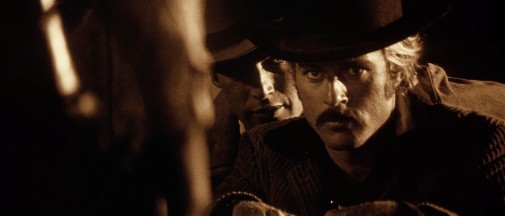
Starring two of the hottest male leads of their time, George Roy Hill's Butch Cassidy and the Sundance Kid was a major triumph. By the end of 1969, it topped the box-office, crowning itself the greatest hit of the year. Part of that success is due to the picture's sheer quality and audacity. We must understand that 1969 was a year when the studio system's cadaver finally decomposed into oblivion while the New Hollywood gave its first signs of life. In that context, this western was a necessary meeting point between past and future, a romantic reminiscence about the westerns of yore that was also full of youthful irreverence. For more information regarding that matter, go read our in-depth look at the 42nd Academy Awards.
That said, neither Hill's directorial ingenuity or William Goldman's screenplay would have been able to achieve that sort of popularity by themselves. Butch Cassidy and the Sundance Kid lives and dies with the two men at its center, a couple of roles that demand the presence of immortal movie stars. Thankfully for everyone involved, the picture has two such icons as its leads. Even better, Paul Newman and Robert Redford are great actors too. While it's true that Newman might be more widely regarded as a consummate thespian, Redford is no slouch, always able of sculpting his star persona into precise variations that match the requirements of his characters.
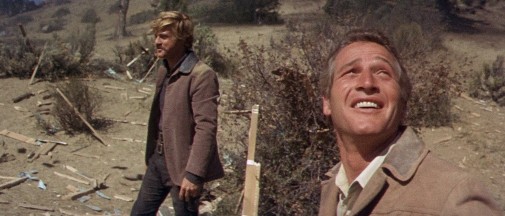
As the titular outlaws, they nail the chemistry between the men with effortless perfection. That's crucial because, despite all its shootouts, Butch Cassidy and the Sundance Kid is, at its heart, a buddy comedy that needs the audience to believe that its titular characters are great friends that would die rather than be separated, two halves of the same coin. The repartee both actors build with each other feels natural and lived-in, selling that idea of unshakeable friendship and loyal devotion so completely that it isn't hard to find homoerotic dimensions in the relationship. They're also great fun to be around, effectively seducing the spectator into wanting to spend time simply observing these guys be themselves.
Chemistry and charisma go a long way, but we shouldn't reduce their performances to just that. This is a film with an unstable tone balance that's always swerving between lightheartedness, robust romance and sorrowful tragedy, forcing its actors to be in a constant negotiation with the audience, their scene partners and the camera. Redford, in particular, has great challenges since the Sundance Kid spends a great part of the film in the background of scenes that are dominated by Newman's Butch. The actor must be a figure of powerful menace looming behind his partner. However, that dangerous quality can't be overplayed or the public might start to question the movie's lionization of two unrepentant criminals.
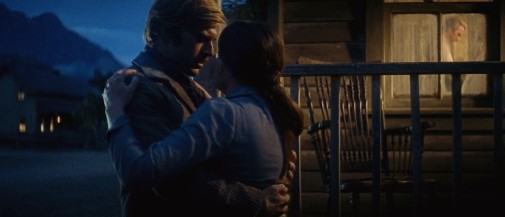
Redford is always ready with a wry smile or a bit of comic mugging, diffusing the tension while maintaining his threatening pose. His first scene with Katharine Ross' enamored schoolteacher is particularly great at showcasing that aspect of his work, marrying playful seduction with a sense of genuine danger. Paul Newman, on the other hand, gets to showboat a lot and does that with his usual panache, making for the most charming train robber that's ever lived. When playing the polyamorous dynamic that develops between himself, Redford and Ross, Newman is particularly great at showing the ease with which the trio shares their affections. It never feels like an emotionally strained scenario but it doesn't come off as unearned either.
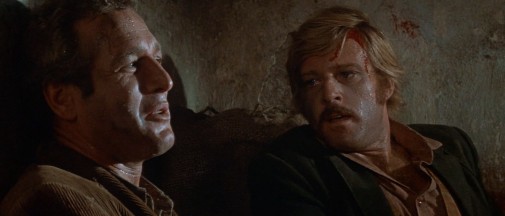
The peak of their performances comes with the fatalistic conclusion of the story when the two companions must face their certain death. Both actors have planted seeds of humanity here and there, be it Redford's frustrations with his partner's plans or Newman's guilt at the act of killing. However, nothing compares to what they must do in these final moments, playing two men who know this is the end and are trying to talk themselves into acceptance. When they speak of future Australian getaways, neither Butch or Sundance are kidding themselves or tricking the audience, they're just resolutely trying to confront their fate with hope instead of panic. Like Thelma and Louise, they do it in a blaze of glory, frozen in time.
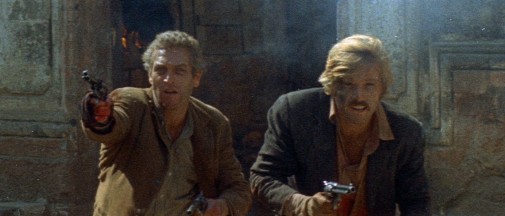
In the end, despite great performances, Redford and Newman suffered from there being two other male leads in a cowboy-themed Oscar favorite of 1969. It's unlikely the Academy would have given a pair of double nominations in the Best Actor category, so the men of Midnight Cowboy got the recognition instead of these joking outlaws. Still, it wouldn't have been unjust to have Butch Cassidy and the Sundance Kid in the line-up. See for yourself, as the film is new to streaming on Starz, and tell us if you would have nominated them.



Reader Comments (17)
I mean, today, Butch and Sundance, and Midnight Cowboy, would just get two pairs of twin noms, one of them fraudulent. The fraudulent noms would probably be Redford and Hoffman, respectively. Search your heart, you know I'm right.
Volvagia - You're absolutely right. Especially regarding Hoffman, who I still think would have won if he had been put in supporting instead of lead back in '69.
more surprisingly, the golden globes ignored them as well
these days, "and the sundance kid" would relegate redford to supporting
Today we adore the comedic appeal of Butch Cassidy and the Sundance Kid,. The film was a huge box office hit. However, in 1969 the initial reviews were mediocre, even poor, in some publications. Roger Ebert called the movie "slow and disappointing."
For AMPAS voters, they responded to the September 1969 release and its high box office receipts with a Best Picture nod and a solid number of technical nominations.. However, comedic work is always devalued. The melodrama of Voight and Hoffman in Midnight Cowboy was more respected than the laughs generated by the charming Newman and Redford.
For those of us who were in the theaters in the late '60s, we remember the controversial ending of the film. Some suggested that freeze frame shoot out was too reminiscent of Bonnie and Clyde's final moments. For others, the deaths of our beloved heroes in a hail of bullets was too close in tone to the nightly news and the televised slaughter of young men in combat in Vietnam.
I think all of these factors played a role in permitting Peter O'Toole (Goodbye, Mr. Chips) to land that fifth Best Actor slot for a well received performance in an unnecessary musical remake of the Best Actor winner of 1939. .
James - Thank you for the wonderful insight. Comments like these are a joy to read and informative too.
Still, considering all you said and the Oscar haul of the film, I'd say they were probably in 6th/7th place behind the five Best Actor nominees. After all, with 7 nominations and 4 wins including Screenplay, the movie was certainly beloved by AMPAS. I'd go as far as to say it was the likely runner-up in Best Picture, as Kevin Jacobsen's podcast suggests.
Even though Goodbye Mr. Chips is far from O'Toole's finest hour, I confess I have some fondness for his performance. The movie is flotsam, but he gets some nice moments of painful sorrow near the end of the musical. I would have certainly preferred him as a winner to John Wayne in True Grit. Hell, Burton would have been a good winner for Anne of the Thousand Days too, though, as we well know, neither him or O'Toole would ever conquer that coveted little golden man.
As always, thank you all for the feedback.
Redford's best.
par: Well, the Globes had no space for Hoffman, Redford or the movie itself, because they had to prop up two flops, one of them the infamous polyamory adaptation of Paint Your Wagon and the other is the more forgotten The Secret of Santa Vittoria.
If Dustin Hoffman had been considered Supporting, they would have been following the example of the New York Film Critics, where Hoffman tied for 3rd place as Supporting Actor and was runner-up behind Voight for Best Actor. 3rd place for Best Actor? Robert Redford, but for Downhill Racer. So I wonder whether competing against himself siphoned off enough votes to keep him out of the Top 5 for the Oscars.
Volvagia - Dustin Hoffman was nominated for a Golden Globe. Both he and Voight lost to John Wayne there, too. In fact, Hoffman was a double nominee, he was nominated for John and Mary (anyone remember that one?) in the Comedy/Musical category where he lost to O'Toole.
Well, Hoffman is kinda the secondary character in Midnight Cowboy, and not just because of the title. That's not to say he should have gone Supporting, but it's not crazy. Tho I don't think that about Redford.
Also, wouldn't 1967 be the year where the New Hollywood showed its first signs of life?
ken s: Mispoke on Hoffman. Sorry. I'm talking about the Globes having no room for Redford and Newman in Mus/Com. That was INSANE. Paint Your Wagon!?
Me - I agree regarding Hoffman and Redford.
Well, I'd say we can see inklings of New Hollywood cinema from the end of the 1950s (Cassavetes' Shadows, for instance). That said, I do believe 1969 represents an important year in the mainstream and general popularity of the New Hollywood cinema. 67 was important too like Mark Harris' fabulous book explores, as was 66 with Who's Afraid of Virginia Woolf? among others. Admittedly, I could have used other words, less decisive. This was a turning point in American cinema but it was a decade long gradual transition from the studios' golden era to a new modernity.
When writing about the subject in future pieces, I'll try to use other phrasings. Thank you, your comment really made me consider how I expressed myself here. I appreciate the feedback.
Redford may not be the most exciting or interesting actor, but he certainly deserved more than just one acting nomination.
Tyler: Agreed. I don't think he deserved what Newman got (9), but at least...three...would have made sense. Keeping The Sting as nomination #1? Let's say 1976 and 2018 Lead Actor, respectively, over Holden and Bale.
Claudio (or anyone else): What were the other two years during that 65- year period where two (or more?) Best Picture nominees received zero acting nods?
The other years where more than 50% of the Best Picture nominees got no acting nods were:
1962
THE LONGEST DAY
THE MUSIC MAN (Preston's snub is bizarre)
MUTINY ON THE BOUNTY
2003
LORD OF THE RINGS: THE RETURN OF THE KING
MASTER AND COMMANDER: THE FAR SIDE OF THE WORLD
SEABISCUIT
Other years got two nominees with zero acting nods and other years have only 1 Best Picture nominee with no nominated actors (I believe that's the more common scenario). 26 of those 65 years feature Best Picture line-ups where all the nominees got some recognition for its actors.
Thanks, Claudio. I figured one of those years must have been in the 2000s. And Robert Preston not being nominated for The Music Man is indeed bizarre.